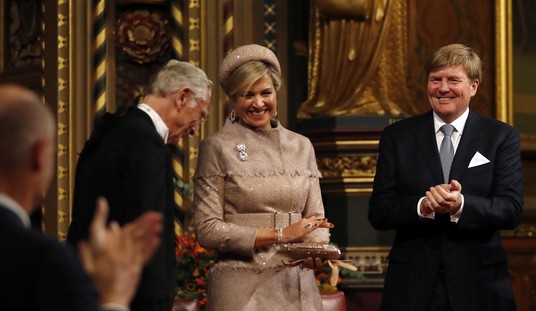At NPR, Berkeley professor, linguist and self-described “grammar geezer” Geoff Nunberg has published a screed about the need to shift the English language to gender-neutral pronouns. He provides a brief history of various pronoun revolutions that have taken place over the centuries, leading up to the bizarre creations we’re seeing today, such as “ze.” But the one the professor settles on, in the end, is the “singular they.”
You can see why people would pick “they.” In everyday speech we often use that pronoun for a single person, though only when the word or phrase it substitutes for — its antecedent, as it’s called — doesn’t refer to a specific individual. So we say, “Somebody lost their wallet,” or, “If a student fails, they have to retake the course.” Or the person we’re referring to may be simply unknown. Your daughter’s cell phone rings at the dinner table; you say, “Tell them you’ll call them back.” Male or female, one caller or several? The pronoun “they” is like, “whatever.”
That singular “they” goes back hundreds of years. Jane Austen’s novels are bristling with sentences like “No one can ever be in love more than once in their life.” But that use of the pronoun fell into disrepute in the 19th century, when grammarians condemned it as incorrect and proclaimed that the so-called generic “he” should be used instead. The idea is that when you write, “Every singer has his range,” the pronoun “his” refers to both men and women — or as they sometimes put it, “the masculine embraces the feminine.”
It’s interesting to see someone who butters their bread as a wordsmith taking a dip into this particular pool. It’s true that the English language, particularly as employed by Americans, has been on an unending evolutionary journey for as long as it’s existed. But that phenomenon is mostly characterized by the addition of new words, old words absorbing new, alternate definitions or the generally annoying addition of portmanteaus that may survive in the long run or turn out to be fads that quickly fade from memory.
The underlying sentence structure, however, doesn’t change nearly as often or as radically. Nunberg attempts to make the case that the singular “they” is a good candidate as a substitute for he or she when referring to the “gender-ambiguous.” (This extends to “their” and “them” as required.) The reason given is that we already use “they” in place of gender-specific pronouns all the time, so the author argues that it would be easy for us to make the adjustment. All you need to do, he claims, is “tweak your internal grammar so that the pronoun ‘they’ can refer to a specific individual.”
But that’s not a tweak. It’s an aberration, and everyone who does any significant amount of either reading or writing knows that it strikes a sour tone in their ears. Oddly enough, Nunberg provides the argument against his own premise early in the article. True, we do use the singular they on a regular basis, but it serves as a placeholder when the specific identity of the word or phrase it’s replacing is unknown or unknowable, or obviously plural. The author provides the example of “Sandy was brushing their hair.”
After tossing that linguistic grenade out onto the field, he immediately (and correctly) notes that the only way that sentence works for most people is if Sandy is in the process of brushing the hair of multiple people. Perhaps he or she is a hairdresser. But inserting “their” if Sandy is brushing his or her own hair breaks the sentence. Nunberg refers to this change as “a small courtesy and sign of respect.” But is it really?
The painful (for some) reality is that we are a species comprised of two genders, with the exceedingly rare exception of those individuals born with anomalous chromosomal structures, primarily in the 23rd pair. Recognizing that fact in speech or writing is a simple thing. To be sure, free speech applies to all and you can call yourself whatever you like. But that doesn’t mean your choice should be forced on everyone else or lead to erratic use of the language.








Join the conversation as a VIP Member